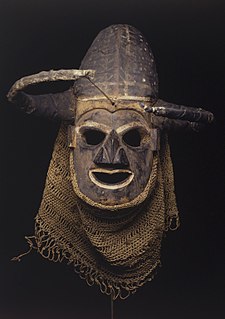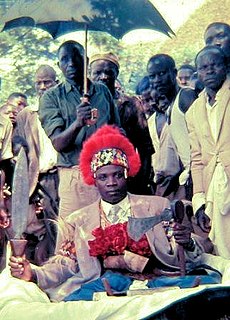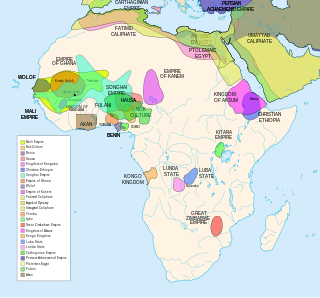
Vatican City, officially Vatican City State, is an independent city-state enclaved within Rome, Italy. Established with the Lateran Treaty (1929), it is distinct from yet under "full ownership, exclusive dominion, and sovereign authority and jurisdiction" of the Holy See. With an area of 44 hectares, and a population of about 1,000, it is the smallest state in the world by both area and population.
The culture of Angola is influenced by the Portuguese. Portugal occupied the coastal enclave Luanda, and later also Benguela, since the 16th/17th centuries, and expanded into the territory of what is now Angola in the 19th/20th centuries, ruling it until 1975. Both countries share cultural aspects: language (Portuguese) and main religion. However, the Angolan culture is mostly native Bantu, which was mixed with Portuguese culture. The diverse ethnic communities with their own cultural traits, traditions and native languages or dialects include the Ovimbundu, Ambundu, Bakongo, Chokwe, Avambo and other peoples.

Lunda Norte is a province of Angola. It has an area of 103,760 km² and a population of 862,566. Angola's first President, Agostino Neto, made Lucapa the provincial capital after independence, but the capital was later moved to Dundo. The province borders the Democratic Republic of Congo in the northeast and Lunda Sul in the south. Municipalities in this province include Capemba-Camulemba, Caumbo, Caungula, Chitato, Cuango, Cuilo, Lubalo, Lucapa, and Shah-Muteba. The province is rich in gold and diamonds, but remains vastly underdeveloped and impoverished. UNITA used the money generated from the sale of diamonds to fund war efforts. Cuango River valley, the richest diamond area of Angola is located in the province. Mining is done by notable companies like DeBeers and Endiama. The Lunda province whose capital was Saurimo was created by the Portuguese colonial empire on July 13, 1895. It was divided into Lunda-Sul and Lunda-Norte subdivisions through a constitution act in 1978 by the People's Movement for the Liberation of Angola (MPLA) government. Iron and manganese mining are also important economic activities. It is well known for its sculptures. The most notable one is The Thinker, a sculpture of a man holding his head. It is rich in terms of flora and fauna.
Lunda, also known as Chilunda, is a Bantu language spoken in Zambia, Angola and, to a lesser extent, in the Democratic Republic of the Congo (DRC). Lunda and its dialects are spoken and understood by perhaps 4.6% of Zambians, and the language is used mainly in the Northwestern province of Zambia. The majority of the Lunda can be found in DRC, especially Katanga Province, as well as in Angola. A small number of Lunda dialects are represented in Namibia.
Lu(u)nda or Ruund may refer to:

The Yaka are an African ethnic group found in southwestern Democratic Republic of the Congo, with Angola border to their west. They number about 300,000 and are related to the Suku people. They live in the forest and savanna region between the Kwango River and the Wamba River. Yaka is also the surname that is used in South Africa and Swaziland, including its clan-name called Dlunge.

Dundo is a former-mining town, now city and the provincial capital of Lunda Norte in Angola. Established in the early part of the 20th century as a planned diamond mining community, Dundo has continued to grow, has its own airport and is now being superseded by a new city, New Dundo.

Kazembe is a traditional kingdom in modern-day Zambia, Southeastern Congo. For more than 250 years, Kazembe has been an influential kingdom or chieftainship of the Kiluba-Chibemba, speaking the Swahili language or the language of the Eastern Luba-Lunda people of south-central Africa. Its position on trade routes in a well-watered, relatively fertile and well-populated area of forestry, fishery and agricultural resources drew expeditions by traders and explorers who called it variously Kasembe, Cazembe and Casembe.

The Nation of Lunda was a confederation of states in what is now the Democratic Republic of Congo, north-eastern Angola, and north-western Zambia, its central state was in Katanga.

The Lunda originated in what is now the Democratic Republic of the Congo along the Kalanyi River and formed the Kingdom of Lunda in the 17th century under their ruler, Mwata Yamvo or Mwaant Yav, with their capital at Musumba. From there they spread widely through Katanga and into Eastern Angola, north-western Zambia and the Luapula valley of Zambia.
The Lunda people of the Luapula River valley in Zambia and DR Congo are called by others the Eastern Lunda to distinguish them from the 'western' Lunda people who remained in the heartland of the former Lunda Kingdom, but they themselves would use Kazembe-Lunda or Luunda with an elongated 'u' to make that distinction..
The Apostolic Prefecture of Lower Congo was a Roman Catholic pre-diocesan missionary jurisdiction in Central Africa's Congo basin.

The following outline is provided as an overview of and topical guide to Zambia:
The Roman Catholic Diocese of (Santíssima) Conceição do Araguaia is a Latin suffragan diocese of the Roman Catholic church, in the Ecclesiastical province of the Metropolitan of Belém do Pará in Brazil.

The Diocese of Rome is a diocese of the Catholic Church in Rome. The Bishop of Rome is the Pope, the Supreme Pontiff and leader of the Catholic Church. As the Holy See, the papacy is a sovereign entity with diplomatic relations, and civil jurisdiction over the Vatican City State located geographically within Rome. The Diocese of Rome is the metropolitan diocese of the Province of Rome, an ecclesiastical province in Italy. The first Bishop of Rome was Saint Peter in the first century. The incumbent since 13 March 2013 is Pope Francis.

Kasongo Lunda is a territory in the Democratic Republic of Congo, located in Kwango Province. The capital lies at Kasongo Lunda. It is the second biggest territory in Congo, located near to the border with Angola.

Kasongo Lunda is a town and seat of Kasongo Lunda Territory, in the Kwango Province of the Democratic Republic of the Congo. The town lies near the border with Angola to the east, here defined by the Kwango River. As of 2012 the town was estimated to have a population of 23,820.
Lunda is a former Ancient Roman city and bishopric and present Latin Catholic titular see in Asia Minor.
Kasongo is a town and territory in the Democratic Republic of the Congo. Kasongo may also refer to











